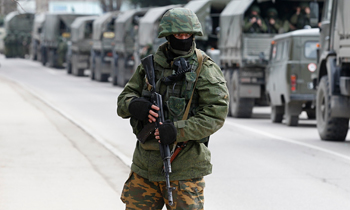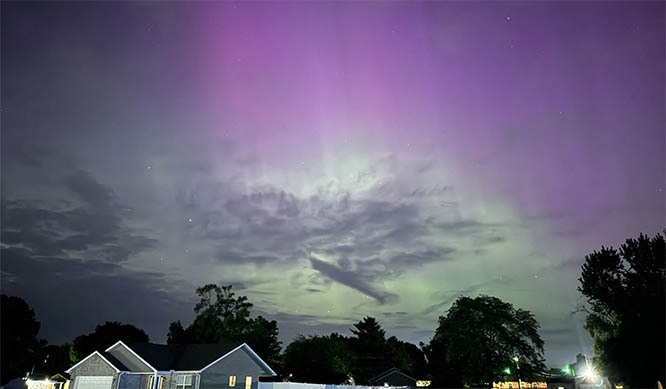
Putin's open assertion of the right to send troops to a country of 46 million people on the ramparts of central Europe creates the biggest confrontation between Russia and the West since the Cold War.
Troops with no insignia on their uniforms but clearly Russian — some in vehicles with Russian number plates — have already seized Crimea, an isolated peninsula in the Black Sea where Moscow has a large military presence in the headquarters of its Black Sea Fleet. Kiev's new authorities have been powerless to stop them.
The United States said Russia was in clear violation of Ukrainian sovereignty and called on Moscow to withdraw its forces back to bases in Crimea. It also urged the deployment of international monitors to Ukraine.
Ukrainian Prime Minister Arseny Yatseniuk, leading a government that took power after Moscow's ally Viktor Yanukovich fled a week ago, said Russian military action "would be the beginning of war and the end of any relations between Ukraine and Russia".
Acting President Oleksander Turchinov ordered troops to be placed on high combat alert. Foreign minister Andriy Deshchytsya said he had met European and US officials and sent a request to Nato to "examine all possibilities to protect the territorial integrity and sovereignty of Ukraine".
The United States will suspend participation in preparatory meetings for a summit of G8 countries in Sochi, Russia, and warned of "greater political and economic isolation", the White House said in a statement after President Barack Obama and Putin held a 90-minute telephone call.
Obama told Putin that if Russia had concerns about ethnic Russians in Ukraine, it should address them peacefully, the White House said.
Putin's move was a direct rebuff to Western leaders who had repeatedly urged Russia not to intervene, including Obama, who just a day earlier had held a televised address to warn Moscow of "costs" if it acted.
Putin told Obama that Russia reserved the right to protect its interests and those of Russian speakers in Ukraine, the Kremlin said.
'Dangerous situation'
Russian forces solidified their control of Crimea and unrest spread to other parts of Ukraine on Saturday. Pro-Russian demonstrators clashed, sometimes violently, with supporters of Ukraine's new authorities and raised the Russian flag over government buildings in several cities.
"This is probably the most dangerous situation in Europe since the Soviet invasion of Czechoslovakia in 1968," said a Western official on condition of anonymity. "Realistically, we have to assume the Crimea is in Russian hands. The challenge now is to deter Russia from taking over the Russian-speaking east of Ukraine."
Putin asked parliament to approve force "in connection with the extraordinary situation in Ukraine, the threat to the lives of citizens of the Russian Federation, our compatriots" and to protect the Black Sea Fleet in Crimea.
The upper house swiftly delivered a unanimous "yes" vote, shown live on television.
Western capitals scrambled for a response.
Speaking at an emergency meeting of the UN security council, US ambassador to the United Nations, Samantha Power, called for the swift deployment of international monitors from the United Nations and the Organization for the Security and Cooperation in Europe (OSCE) to Ukraine to help stem the escalating crisis there.
Defence secretary Chuck Hagel told his Russian counterpart Sergei Shoigu during a phone call that Moscow's military intervention risked creating further instability and an escalation "that would threaten European and international security", the Pentagon said. A US defence official said there had been no change in US military posture or in the alert status of forces.
EU foreign affairs chief Catherine Ashton urged Moscow not to send troops. Swedish foreign minister Carl Bildt said this would be "clearly against international law". Czech President Milos Zeman likened the crisis to the 1968 invasion of Czechoslovakia.
"Urgent need for de-escalation in Crimea," tweeted Nato secretary-general Anders Fogh Rasmussen. "Nato allies continue to coordinate closely."
Nato ambassadors will meet in Brussels on Sunday to discuss the situation, Rasmussen tweeted. "North Atlantic Council will meet tomorrow followed by Nato-Ukraine Commission," he wrote.
Putin said his request for authorization to use force in Ukraine would last "until the normalization of the socio-political situation in that country". His justification — the need to protect Russian citizens — was the same as he used to launch a 2008 invasion of Georgia, where Russian forces seized two breakaway regions and recognized them as independent.
In a statement posted online, the Kremlin said that in his phone call with Obama, Putin "underlined that there are real threats to the life and health of Russian citizens and compatriots on Ukrainian territory".
Flags torn down
So far there has been no sign of Russian military action in Ukraine outside Crimea, the only part of the country with a Russian ethnic majority, which has often voiced separatist aims.
A potentially bigger risk would be conflict spreading to the rest of Ukraine, where the sides could not be easily kept apart.
As tension built on Saturday, demonstrations occasionally turned violent in eastern cities, where most people, though ethnically Ukrainian, are Russian speakers and many support Moscow and Yanukovich.
Demonstrators flew Russian flags on government buildings in the cities of Kharkiv, Donetsk, Odessa and Dnipropetrovsk.
In Kharkiv, scores of people were wounded in clashes when thousands of pro-Russian activists stormed the regional government headquarters and fought pitched battles with a smaller number of supporters of Ukraine's new authorities.
Pro-Russian demonstrators wielded axe handles and chains against those defending the building with plastic shields.
In Donetsk, Yanukovich's home region, lawmakers declared they were seeking a referendum on the region's status.
"We do not recognize the authorities in Kiev, they are not legitimate," protest leader Pavel Guberev thundered from a podium in Donetsk.
Thousands of followers, holding a giant Russian flag and chanting "Russia, Russia" marched to the government headquarters and replaced the Ukrainian flag with Russia's.
Coal miner Gennady Pavlov said he backed Putin's declaration of the right to intervene. "It is time to put an end to this lawlessness. Russians are our brothers. I support the forces."
"War has arrived"
On Kiev's central Independence Square, where protesters camped out for months against Yanukovich, a World War II film about Crimea was being shown on a giant screen, when Yuri Lutsenko, a former interior minister, interrupted it to announce Putin's decree. "War has arrived," Lutsenko said.
Hundreds of Ukrainians descended on the square chanting "Glory to the heroes. Death to the occupiers."
Although there was little doubt that the troops without insignia that have already seized Crimea are Russian, the Kremlin has not yet openly confirmed it. It described Saturday's authorization as a threat for future action rather than confirmation that its soldiers are already involved.
A Kremlin spokesman said Putin had not yet decided to use force, and still hoped to avoid further escalation.
In Crimea itself, the arrival of troops was cheered by the Russian majority. In the coastal town of Balaclava, where Russian-speaking troops in armoured vehicles with black Russian number plates had encircled a small garrison of Ukrainian border guards, families posed for pictures with the soldiers. A wedding party honked its car horns.
"I want to live with Russia. I want to join Russia," said Alla Batura, a petite 71-year-old pensioner who has lived in Sevastopol for 50 years. "They are good lads ... They are protecting us, so we feel safe."
But not everyone was reassured. Inna, 21, a clerk in a nearby shop who came out to stare at the armoured personnel carriers, said: "I am in shock. I don't understand what the hell this is ... People say they came here to protect us. Who knows? ... All of our (Ukrainian) military are probably out at sea by now."
The rapid pace of events has rattled the new leaders of Ukraine, who took power in a nation on the verge of bankruptcy when Yanukovich fled Kiev last week after his police killed scores of anti-Russian protesters in Kiev. Ukraine's crisis began in November when Yanukovich, at Moscow's behest, abandoned a free trade pact with the EU for closer ties with Russia.
For many in Ukraine, the prospect of a military conflict chilled the blood.
"When a Slav fights another Slav, the result is devastating," said Natalia Kuharchuk, a Kiev accountant.
"God save us."








Comments
Add new comment